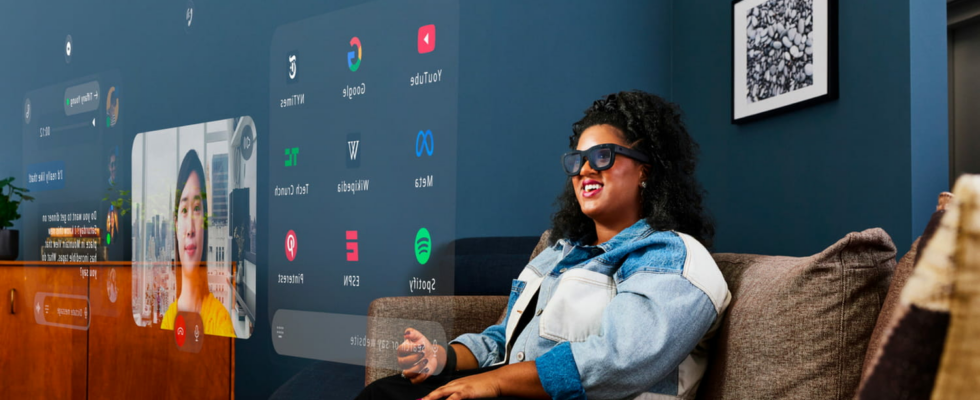Meta has just unveiled Orion, its augmented reality glasses presented as the most advanced in the world, which can be controlled by thought. Still in the prototype stage, they already prove impressive!
At his annual developer conference, Meta Connect, Mark Zuckerberg presented a series of products focused on virtual reality (VR) on Wednesday, September 25: the Quest 3S headset – a more affordable version of the Quest 3 –, Ray-Ban glasses enhanced with new functions, and the Orion project, augmented reality glasses called “holographic”. These are “the most advanced pair of augmented reality glasses ever designed”the company said in a press release. Just that!
This product, whose development was announced five years ago, is halfway between the Apple Vision Pro, Ray-Ban smart glasses and a smartphone. It allows you to add a layer of virtuality to the visible world, by displaying application interfaces superimposed on the real world, by recognizing objects present in their field of vision and by adding elements in augmented reality. Its modest objective is simply to “blurring the boundaries between the virtual and real world” and replace smartphones. For now, Orion is just a prototype for “to build a bridge between the physical world and the virtual world”.
Orion Glasses: A Thick Accessory with Impressive Technology
The Orion glasses have a design similar to classic glasses, although a little thick, which actually hides cutting-edge technology. Unlike the Meta Quest 3S or the Apple Vision Pro, there is no screen on the lenses – which are not made of glass, but of silicon carbide – but Micro LED projectors directly integrated into the frame. These are the ones that send light to the retina in order to simulate the presence of transparent images, in augmented reality, via waveguides in the lenses. This technology makes it possible to add a layer of visual information to the real world. The glasses also have speakers, microphones, cameras on the sides and at the front, all connected via Wi-Fi 6 to an external box.
In concrete terms, the Orion glasses, which offer a wide 70° field of vision – less than a VR headset, but more than regular AR glasses – allow you to view applications, make video calls or play games, all while really seeing the “real” world. For example, when the user receives a message, the accessory is able to project it directly in front of their eyes, which saves them from having to take out their smartphone. With Meta AI, the virtual assistant boosted by artificial intelligence introduced last year, Orion can also understand what the user is looking at in the physical world. For example, it is possible to open your fridge and ask the glasses for a recipe based on the ingredients it contains, and the instructions are then displayed in a floating window.
Orion glasses: a prototype that still needs to be improved
Orion glasses do not work alone, the user must wear a “neural bracelet”a kind of screenless smart bracelet that uses electromyography (EMG) to interpret neural signals, which are translated into inputs in a matter of milliseconds. In short, you only have to think for the glasses to perform an action. They can also be controlled by voice, gestures and eye tracking, thanks to sensors integrated into the frame. For example, you can simply pinch your index finger with your thumb to select items, or pinch your middle finger and thumb to call up or hide the application launcher.
Although promising, the Orion project is not yet ready for commercialization. It is a research prototype, and Meta prefers to take the time to refine its technology before launching it on the market. This is partly explained by the astronomical cost of manufacturing the device, which is on the order of $10,000 per unit, due to the difficulty and high cost of reliably manufacturing silicon carbide lenses. We will have to be patient!


